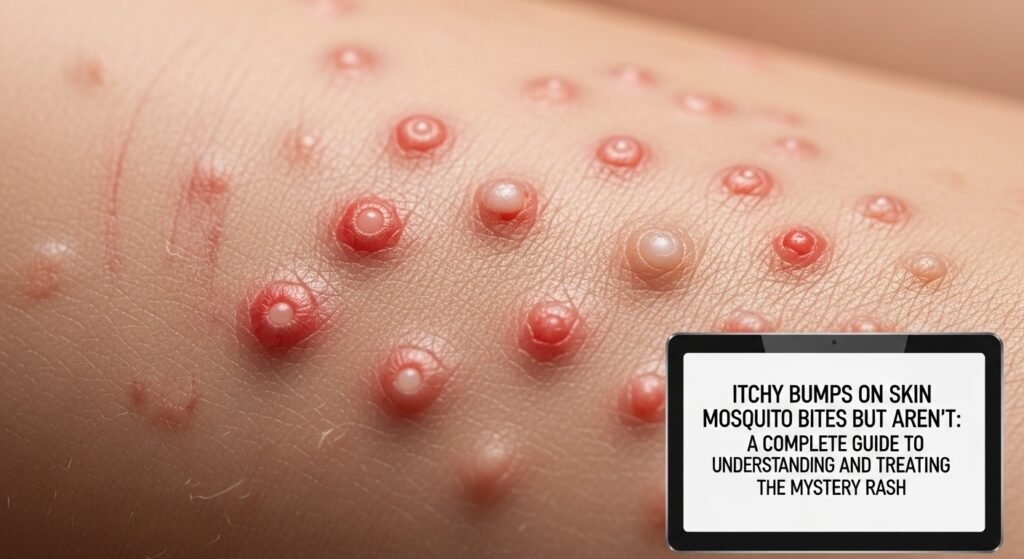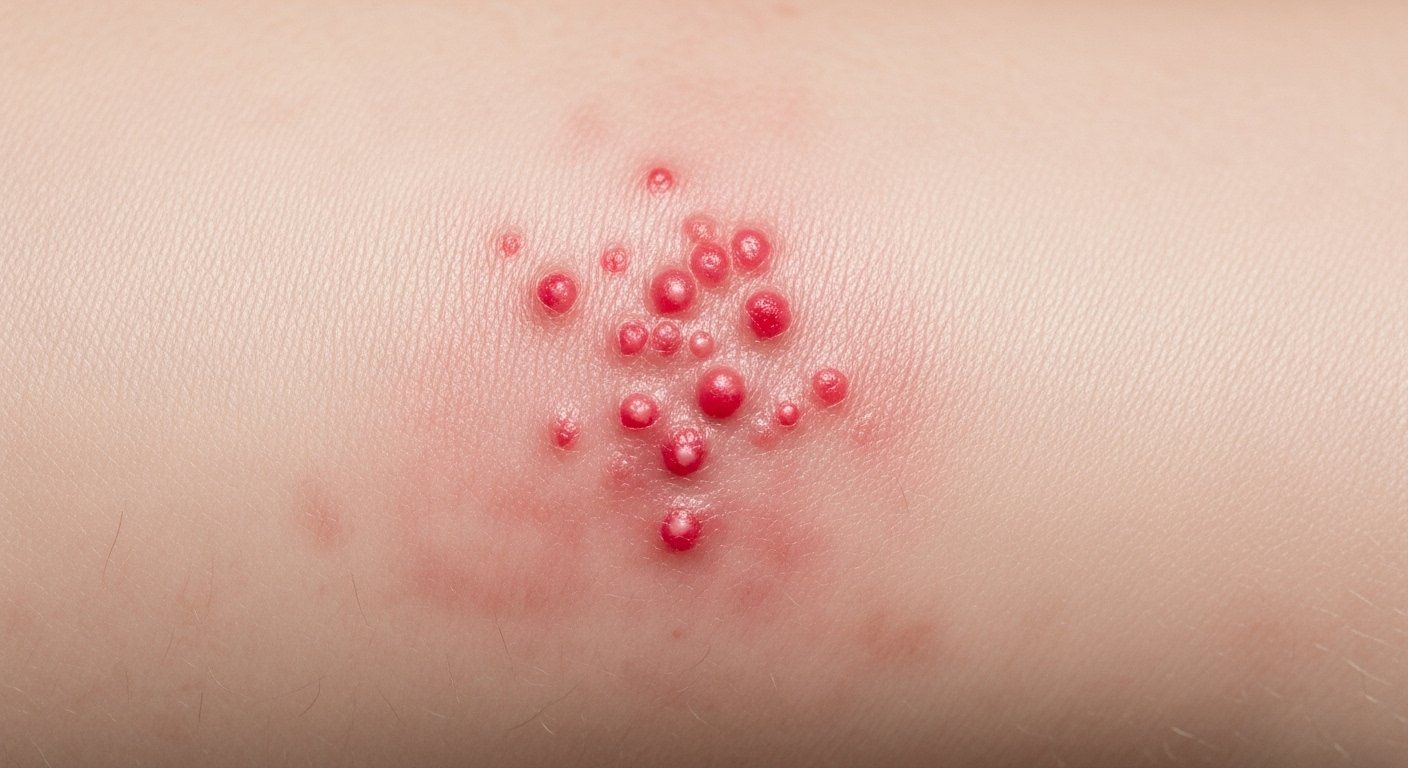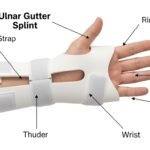Have you ever noticed small, itchy bumps on your skin that look just like mosquito bites—but you know for sure they aren’t? Maybe you haven’t been outside. Maybe no one else around you has bites. Or maybe the bumps keep coming back again and again. These itchy bumps on skin like mosquito bites but aren’t can be annoying, scary, and confusing. What causes them? Are they serious? How can you make them go away? Don’t worry. In this complete and easy-to-follow guide, we explain what these bumps could be, how to tell the difference between them and real bug bites, and what you can do at home—or with a doctor’s help—to treat and prevent them.
Whether you’re a parent trying to figure out a child’s rash, a person with sensitive skin, or just someone wondering why you’re always itchy with no clear reason, you’ll find clear answers here. This article is packed with simple explanations, expert advice, and real tips to help you feel better, faster. Let’s explore the most common causes of itchy bumps on skin like mosquito bites but aren’t—and how to tell what’s happening under your skin.
What Are These Itchy Bumps If They’re Not Mosquito Bites?
Many people experience itchy bumps on skin like mosquito bites but aren’t actual insect stings or bites. These red or flesh-colored bumps can appear almost anywhere on the body. They tend to be very itchy and sometimes pop up suddenly, like overnight. You’re not imagining it—they really do look like bug bites. But if you’ve ruled out mosquitos, bed bugs, fleas, or other insects, then what you’re seeing could be something else entirely. These bumps might be caused by skin allergies, heat, medications, stress, or a condition like hives or eczema. Identifying the real cause is the first step to finding relief.
Hives (Urticaria): A Common Culprit
One of the most frequent reasons for itchy bumps on skin like mosquito bites but aren’t is a condition called hives. Hives, or urticaria, are raised, red, or skin-colored areas that appear suddenly and are very itchy. They can last a few minutes or several hours, then fade and reappear somewhere else. Hives are often triggered by allergies—food, medicine, or environmental elements like pollen or pet dander. But they can also be caused by stress, heat, cold, or even pressure on the skin. Over-the-counter antihistamines usually help, but if they keep returning, a doctor can help with long-term treatment.
Eczema: When Dry Skin Becomes Inflamed
Another possible cause of itchy bumps on skin like mosquito bites but aren’t is eczema, also known as atopic dermatitis. Eczema makes skin dry, red, bumpy, and very itchy. Scratching only makes it worse, creating small irritated spots that look like welts. These bumps often appear on elbows, knees, scalp, hands, or the neck. People with eczema often have a history of allergies or asthma. The cause isn’t always clear, but it may be linked to sensitive skin or an overactive immune system. Moisturizers and gentle soaps help, and stronger treatments are available if needed.
Allergic Reactions and Contact Dermatitis
Itchy bumps on skin like mosquito bites but aren’t bites at all might be allergic reactions to something you’ve touched. This is called contact dermatitis. It happens when your skin reacts to substances like soap, detergent, plants, metal (like nickel in jewelry), or chemicals in makeup or fragrances. The bumps often appear where the contact happened. They might feel swollen or warm and can develop into rashes or blisters if not treated. Washing the area, using skin-soothing creams, and avoiding the trigger usually helps. Sometimes doctors may confirm the allergen with a patch test if the reaction keeps happening.
Heat Rash or Sweat Bumps
If you’re in a hot or humid environment, your itchy bumps on skin like mosquito bites but aren’t could be heat rash. Also called miliaria, heat rash happens when sweat ducts get clogged. This causes small, itchy red or clear bumps, usually on the neck, back, chest, or under clothing. It’s most common in babies, but anyone can get it. It usually goes away when the skin cools down. Try wearing loose, breathable clothes and using powder to reduce sweat and friction. Keeping your body cool and dry is the best way to prevent this type of skin irritation.
Reactions to Medications
Sometimes, itchy bumps on skin like mosquito bites but aren’t appear as a side effect of new medications. This can be part of an allergic skin reaction. If you’ve recently started a new prescription, antibiotic, or even a supplement, watch for itching, swelling, or red bumps. Some medication reactions also cause rashes spread over large parts of the body. If this happens, stop using the drug and call your doctor right away. Serious drug-related skin reactions can become dangerous fast, so don’t ignore widespread itching, blistering, or peeling.
Bug Bites That Aren’t Mosquitoes
While you’re sure you’re not dealing with mosquitos, remember that itchy bumps on skin like mosquito bites but aren’t could still be caused by other bugs. Fleas, bed bugs, and mites can each cause small, itchy red bumps. Flea bites tend to be near the ankles or legs. Bed bugs leave straight-line bite marks, often on the arms or shoulders. Mites like scabies cause severe nighttime itching and tiny rash-like bumps. If more than one person in your home is getting bites, it’s a sign to look into possible pest infestations. Treating the bugs is key before the itching can stop.
Skin Conditions That Mimic Insect Bites
Some skin diseases also cause itchy bumps on skin like mosquito bites but aren’t related to insects or allergies at all. Conditions like dermatitis herpetiformis (linked to gluten sensitivities), lichen planus, or keratosis pilaris can all create bumpy, itchy skin. These bumps may come and go and don’t respond to usual treatment. They can even stay for months. If you’ve tried antihistamines or creams and see no change, seeing a dermatologist is important. A skin doctor can test and diagnose the condition correctly and recommend treatment based on your skin type.
Could It Be Stress?

It might sound surprising, but emotional stress can actually cause itchy bumps on skin like mosquito bites but aren’t related to any physical allergy or bug. Stress triggers the release of certain body chemicals like histamine, which can lead to hives or irritation. People often find their mysterious rashes get worse during busy, anxious, or difficult times. In these cases, relaxation methods like deep breathing, meditation, regular sleep, or reducing screen time can help. Stress-related skin flare-ups can come and go quickly, but learning how to manage daily stress makes them easier to handle.
When to See a Doctor
Some itchy bumps on skin like mosquito bites but aren’t are simple and go away on their own. But if the bumps are painful, spreading quickly, forming blisters, or don’t improve in a few days, it’s a smart choice to see a medical expert. Also call your doctor if you have a fever, trouble breathing, or swelling in your mouth or face—those could be signs of a serious allergic reaction. A dermatologist or allergist can help you get clear answers with allergy tests, bloodwork, or skin biopsies. The sooner you catch the cause, the faster the relief.
Best Home Remedies to Try
For mild itchy bumps on skin like mosquito bites but aren’t serious, home care can make a big difference. Cool compresses with a clean cloth help reduce swelling. Oatmeal baths are calming for itchy skin. Use fragrance-free moisturizers and gentle, non-soap cleansers. Aloe vera gel or calamine lotion can soothe itchiness fast. Avoid scratching—cover the area with soft clothing or use anti-itch creams as needed. Hydrating from the inside also helps, so drink plenty of water. Wearing cotton clothes and showering after sweating can keep the bumps from getting worse.
Over-the-Counter Treatments That Help
If you need relief now, several easy-to-find products may help with itchy bumps on skin like mosquito bites but aren’t. Antihistamines like Benadryl or Claritin help if allergies or hives are the cause. Creams with hydrocortisone reduce redness and swelling. Products like Sarna, Gold Bond anti-itch, or Aveeno eczema cream can also ease symptoms. Always read the label and follow directions—don’t use products longer than suggested without talking to a doctor. If your bumps don’t improve in a week or two, switch strategies or get professional help right away.
Tips to Prevent Future Bumps
Preventing itchy bumps on skin like mosquito bites but aren’t is all about smart skincare and staying aware of your triggers. Wash your skin gently and moisturize daily to build a strong barrier. Avoid harsh soaps, perfumes, or fabrics that make your skin itch. Wash new clothes before wearing them. In warm weather, try to stay cool and keep sweat under control with breathable fabrics. If you’re allergy-prone, avoid known irritants and keep indoor air clean. Doing a little skin self-care each day helps reduce flare-ups and makes you feel more in control over your skin.
FAQs
1. Are itchy bumps that aren’t mosquito bites dangerous?
Usually not, but if they last long, spread fast, or come with other symptoms, see a doctor.
2. What helps mysterious itchy bumps go away?
Cool baths, gentle skin care, antihistamines, and avoiding triggers are your best first steps.
3. Could these bumps be from bed bugs or fleas?
It’s possible. Bed bugs and fleas leave small itchy bumps. Check your home, bedding, and pets.
4. Do I need allergy testing for these bumps?
If bumps keep returning or flare with certain products, allergy testing could find the exact trigger.
5. Can stress cause itchy skin without any bites?
Yes, stress releases body chemicals that can create hives or itchy patches without any physical cause.
6. Should I pop or scratch the bumps?
No, avoid popping or scratching. It can lead to infection or scarring. Let them heal naturally.
Final Thoughts
Having itchy bumps on skin like mosquito bites but aren’t actual bites can be frustrating and even stressful. But the good news is that most of the time, they’re harmless and treatable once you figure out the cause. By paying attention to when the bumps show up, what products you use, and how your skin reacts, you can take smart steps to get relief. Don’t ignore your symptoms, and don’t be afraid to ask for help if they get worse. There are treatments, remedies, and professionals ready to get your skin back to feeling and looking its best.






